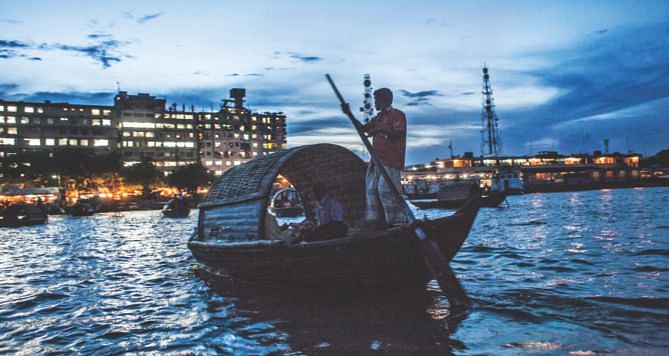Tanvir Mokammel's fight for Dhaleshwari
Tanvir Mokammel's fight for Dhaleshwari
'Activist film' planned to save a river

Director Tanvir Mokammel's love affair with rivers is nothing new. He has made two feature films whose stories set against the backdrop of the country's liberation war unfold on the banks of river Chitra and Modhumati. He has also made a couple of documentaries on the river Karnaphuli and Jamuna, and about the plight of people living on their banks.
But with his next project -- a documentary titled “Dhaleshwari Kotha” (The Last River of Dhaka Basin)--Tanvir says he wants to go beyond film-making and launch a social movement to save the river from pollution.
“The rivers of Dhaka basin--Buriganga, Turag, Shitalakhya and Balu -- all are now extremely polluted. Only the Dhaleshwari, a river with lot of history and culture, has managed to remain relatively pollution-free. But the way factories, brick kilns and unplanned residential areas are growing up beside the river and the way river-beds are being occupied illegally by the rich and the powerful, it will not be long for the Dhaleshwari to lose its navigability and become just another polluted river of the Dhaka basin,” Tanvir told The Daily Star.
Tanvir said his one-hour research-based documentary will try to explore the pros and cons of how to save the river and this is where he wants to go beyond film-making and venture into the role of an activist-director by organising all stake-holders: farmers, boatmen, fishermen, weavers and local politicians and authorities-- along the banks of the river for a social movement, to save Dhaleshwari so that the river does not meet the same fate as the other rivers of Dhaka basin.
According to the director, he would prefer to call “Dhaleshwari Kotha” an 'activist film'.
“This venture will not just be a documentary film per se. To save the river with the help of the fishermen, farmers, boatmen and other stake-holders of Manikganj and Munshiganj region and with the teachers and students of the Bangladesh Film Institute, my unit members will try to mobilise a social movement around the Dhaleswari river area to save the river. The documentary film will be part of that movement,” said Tanvir.
The research of the film is completed and the shooting of the documentary will begin in November, he said, adding it will take at least six months to make the documentary.
Replying to a question, Tanvir said while in his earlier feature films like “Chitra Nadir Parey” and “Nadir Naam Modhumati”, the rivers were a part of the setting, in documentary “Karnaphulir Kanna”, the river was more symbolic of the predicament of the tribal populace of Chittagong Hill Tracts. In another documentary “Oyi Jamuna”, Tanvir's focus was on erosion of banks along the river and how it affects the lives of the people by portraying the life and carrying their views.
“Dhaleshwari Kotha” will be different from those films in the sense the film will deal with the threat of river pollution and encroachment of land on the river-bed and along the river by the high and the mighty flouting laws, said Tanvir. Naturally, the picturesque countryside of Bangladesh will be in plenty in the documentary, he added.
The documentary will have extensive interviews with the ordinary people whose lives are entwined with that of Dhaleshwari, but most of all, what the director wants his effort to be is to see a film being born out of a social movement to save a river.